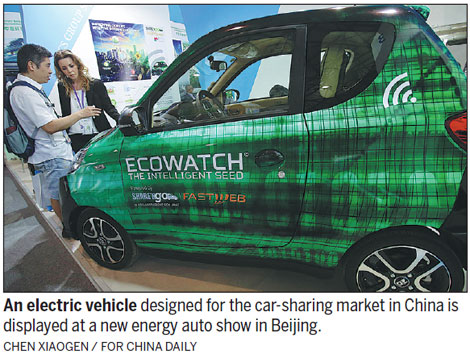Automotive executives choose China as key pick for new mobility services
A growing number of senior managers see China as their top pick for launching new mobility services and data-driven business models, according to a global survey by KPMG released Thursday.
The survey of 3,000 professionals in the automotive and technology industry, 900 of them senior executives, found that 20 percent of global executives identified China as the number one country to launch new products and mobility services, up from 16 percent and 15 percent respectively in 2017.
Overall 15 percent of respondents said the world largest car market is the place to implement new data-driven business models, up from 13 percent last year. The United States and Germany are also key destinations for pilot launches.

"Growing mobility needs, insufficient public transportation and a wider acceptance on shared economy are driving innovation in intelligent mobility, new energy vehicles and autonomous driving," said Huu-Hoi Tran, partner and head of Automotive China at KPMG China.
China has been the world's largest new energy car market since 2015, with at least 1.7 million such cars on its roads as of the end of 2017.
Sales of new energy passenger cars totaled 32,000 units, a 480 percent surge year-on-year, according to statistics from the China Passenger Car Association.
Tran said: "China will maintain its fast pace in new energy car development, while Internet Plus vehicles and intelligent mobility will also be key priorities. We expect Chinese players to achieve significant breakthroughs in these areas this year." The survey found that OEMs from China are closing in on their competition in innovative technologies.
Two of the top 10 picks were from China when respondents were asked which manufacturers would be leaders in electric mobility and autonomous driving technology by 2025.
A favorable infrastructure and regulatory regime in China is highlighted as a key growth driver, according to the survey.
In terms of areas with the largest potential, the survey highlighted a big difference in perception between Chinese and global respondents.
Global executives said China is likely to become a market leader in product-driven innovations, such as electric cars (35 percent) and fuel cell electric vehicles (25 percent).
Chinese executives, on the other hand, indicated China's strength in service-driven and business model innovations such as car-sharing (39 percent). Last week, major Chinese ride-hailing company Didi Chuxing announced a plan to partner with automakers, charging network operators and after-sales service providers, to build an open new energy car-sharing system.
The 12 carmakers involved include leading new energy car producers BAIC BJEV and BYD, as well as the international Renault-Nissan-Mitsubishi alliance.
DiDi said it hopes to leverage its strength in AI and national network to empower the entire automotive industry chain.
Under the partnership, DiDi will open its platform to automakers' own sharing services.
Ogi Redzic, senior vice-president of Connected Vehicles and Mobility Services for Renault-Nissan-Mitsubishi, said the potential business and technology opportunities the alliance will explore with DiDi were "quite promising".
Tran said China needs innovative mobility solutions due to urbanization, traffic congestion and the slow development of public transportation in some cities.
"Carpooling, sharing and hailing services, for example, are already widely accepted and we expect to see even more innovation, given the pace of digitalization in China," Tran said.
Tran's prediction is in line with a study by GM Insights, which said the global car-sharing market is expected to grow 34 percent annually from 2017 to 2024, while the annual growth rate in China will exceed 40 percent.
(China Daily 02/12/2018 page18)














